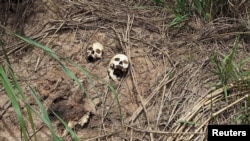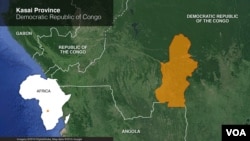The United Nations high commissioner for human rights is seeking to draw attention to reports of massive rights violations in Democratic Republic of Congo's Kasai Central and Kasai Oriental provinces.
High Commissioner Zeid Ra-ad al-Hussein is calling on the U.N. Human Rights Council to establish an international investigation because, he says, the DRC government has failed to mount a credible inquiry.
The U.N. reports an estimated 1.3 million people from Kasai have been internally displaced and 30,000 have fled to neighboring Angola since a flare-up of violence in August.
The killing of a tribal chief by police and members of the army-triggered revenge attacks and counterattacks between the chief's Kamuina Nsapu militia and government security forces.
The high commissioner's spokeswoman, Ravina Shamdasani, says her office has documented 42 mass graves, allegedly dug by the Congolese army — although the number may be much higher.
"Reports of summary executions and other killings — including of children — as well as allegations of sexual violence, have been documented since August 2016," Shamdasani said. "The U.N. Joint Human Rights Office of the DRC continues to receive allegations of serious human rights violations, but security constraints have hindered further investigations on our part."
Shamdasani tells VOA the government has conducted some investigations into crimes committed by the Kamuina Nsapu militia, but none into crimes allegedly committed by the army and police.
"Given the gravity and the scale of these crimes and given the history of endemic impunity in the DRC, the high commissioner feels that it is essential for the international community to throw its weight behind this investigation, to ensure that the victims receive justice and that the perpetrators know that we are watching," she said.
Shamdasani says the high commissioner has offered to help the government mount a credible, transparent investigation since early May, but that the government's response has fallen short of what is expected.
Therefore, she says, the high commissioner feels obliged to call worldwide attention to this situation.





